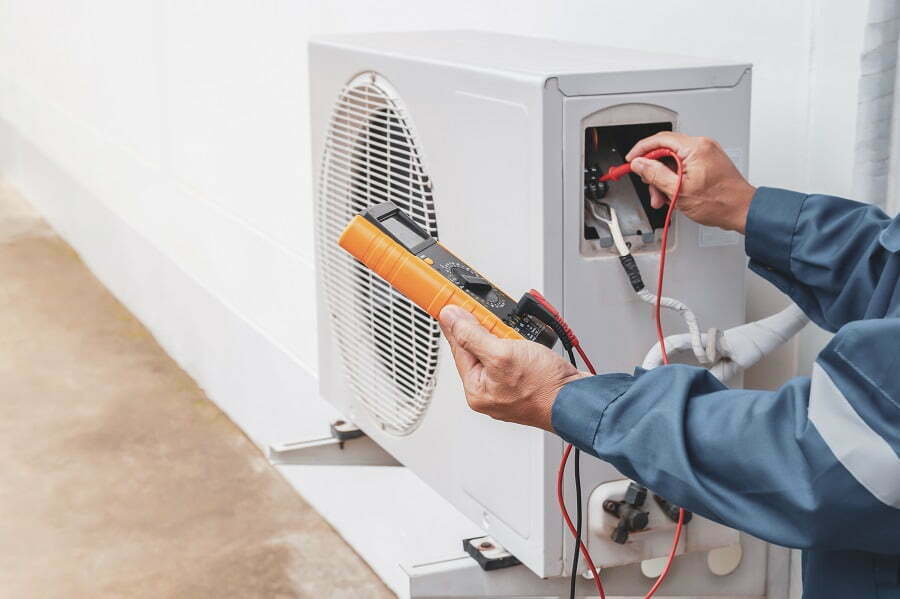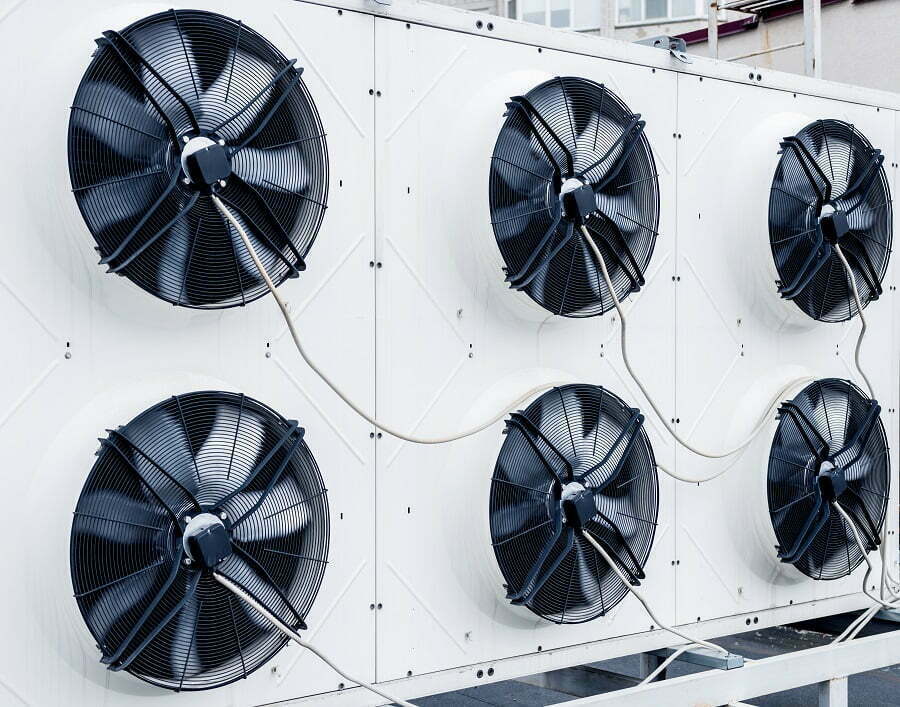Last updated on
Several components work together to ensure the efficient and dependable operation of air conditioning systems. The AC capacitor stands out among these components as a small but crucial component that plays a significant role in the operation of an air conditioning unit.
Despite its diminutive size, the capacitor has the ability to make or break the system’s performance. To fully appreciate the significance of the AC capacitor, one must look into its function, know how it operates, and become familiar with the indicators of a defective capacitor.
In this article, we intend to provide you with the knowledge you need to understand the critical function of the AC capacitor in your air conditioning system. By understanding the fundamentals of its function and identifying the indications of a defective capacitor, you can maintain the performance of your air conditioner.
If you are facing any kind of HVAC-related issue, including a malfunctioning AC capacitor, consider checking out for their top-notch professional HVAC services.
What Is an AC Capacitor?

Imagine your air conditioning system as a complex orchestra, with each component performing uniquely. Similar to a conductor, the capacitor directs and orchestrates the passage of electrical energy to ensure the system’s harmonious operation. Without a working capacitor, the symphony may falter, resulting in a less-than-ideal chilling experience.
It acts as a transient power storage unit that assists in starting the motor and maintains its seamless operation. Without a functional capacitor, the motor may struggle to start or cease to function entirely.
By understanding the function of the capacitor and recognizing the indications of a malfunctioning capacitor, homeowners can take proactive steps to maintain the performance of their air conditioning units. Regular maintenance and prompt replacement of defective capacitors can significantly increase the longevity and efficiency of an air conditioning system.
How Does It Operate?

Let’s understand the operation of AC capacitors.
Components in a Capacitor
Two metal plates are separated by an insulating material known as a dielectric to form an AC capacitor. The dielectric can be composed of a variety of substances, including paper, plastic, or oil. The plates, typically made of aluminum, supply the required surface area for energy storage.
Types of Capacitors
AC systems primarily have two types of capacitors: start capacitors and run capacitors. Start capacitors provide supplemental power during motor initiation, allowing it to surmount inertia and begin rotation. Once the motor is up and running, the run capacitor provides a constant supply of electrical energy to maintain the motor’s efficient operation.
Motor Ignition
When the air conditioner is switched on, the start capacitor supplies the motor with an initial surge of energy. This additional power assists the motor in overcoming resistance and initiating rotation. The start capacitor disengages when the motor reaches a predetermined speed.
Motor Running
Once the motor is in motion, the run capacitor guarantees a steady flow of electrical energy to maintain the motor’s optimal speed. It helps maintain the motor’s efficacy by increasing the power factor and decreasing the reactive power consumption.
Signs of a Defective Capacitor

Now that we have understood the workings of an AC capacitor, let’s go through the signs of a defective capacitor. According to Autumn Air, these are the most common defects of capacitors.
Hard Starting
A defective capacitor may make it difficult to activate the air conditioner. The motor may generate a buzzing sound or refuse to start. Additionally, the frequent triggering of circuit breakers may indicate faulty capacitors.
If the capacitor is malfunctioning, the cooling capacity of the air conditioning system may diminish. It may be difficult for the air conditioner to reach the intended temperature, resulting in inadequate chilling performance.
Intermittent Operation
A faulty capacitor can lead to erratic operation of the air conditioner. It may frequently start, halt, or close down unexpectedly. Inconsistent operation can substantially impact the refrigeration system’s comfort and efficacy.
Bulging or Leaking
Physical indicators of a defective capacitor are protruding or seeping. The internal pressure can cause the capacitor to expand or rupture over time, necessitating immediate replacement.
Replacing a Faulty Capacitor
The next step is to replace a faulty capacitor. Here are a couple of ways:
Cautionary Measures
Before attempting to replace a defective capacitor, it is essential to disengage the air conditioning unit’s power supply. Even when the system is turned off, capacitors can store electrical energy, posing a potential electrical hazard.
Professional Assistance
Despite the apparent simplicity of replacing a capacitor, it is advisable to seek professional assistance. HVAC technicians have the knowledge and skills necessary to handle electrical components and precisely diagnose the underlying problem safely.
Importance of professional assistance
It is of the utmost importance to seek professional assistance when working with AC capacitors. Although it may be tempting to manage the replacement or repair yourself, the complexity of electrical components necessitates the assistance of HVAC specialists. Listed below are a few reasons why professional assistance is vital:
Safety
Even when the power source is disconnected, capacitors store electrical energy. When capacitors are mishandled or discharged improperly, severe electrical shocks and other safety hazards can result. Technicians in the HVAC industry are trained to manage capacitors and mitigate potential risks safely.
Accurate diagnosis
Identifying problems with capacitors requires specialized knowledge and diagnostic equipment. Professionals in the HVAC industry can accurately diagnose whether a defective capacitor is the fundamental cause of the problem or if there are other latent issues influencing the air conditioning system’s performance.
Right installation
Installation of a new capacitor requires accurate connections and adherence to the manufacturer’s instructions. HVAC technicians are acquainted with the requirements and can ensure proper installation, thereby minimizing the risk of further system damage.
Warranty Factors to Consider
If its manufacturer’s warranty still covers your air conditioning system, attempting repairs or replacements yourself may void the warranty. By relying on a professional, you can ensure that any necessary repairs or replacements are carried out in accordance with the manufacturer’s specifications, thereby preserving your warranty coverage.
The Takeaway
The AC capacitor is an essential component that facilitates the start-up and operation of the air conditioning unit’s motor. It stores electrical energy and provides the required startup power surge. A defective capacitor can result in motor starting difficulties, diminished cooling capacity, erratic operation, and physical indications such as protruding or seeping.
If any of these symptoms are observed, it is imperative to seek professional assistance to replace the defective capacitor in a safe manner. By knowing the fundamentals of how an AC capacitor operates and its significance to the overall operation of an air conditioning system, homeowners can better appreciate the significance of regular maintenance and address any capacitor-related issues immediately.
A capacitor that functions properly contributes to the efficient cooling performance of an air conditioning unit, ensuring optimal comfort in sweltering weather.
Recap:



